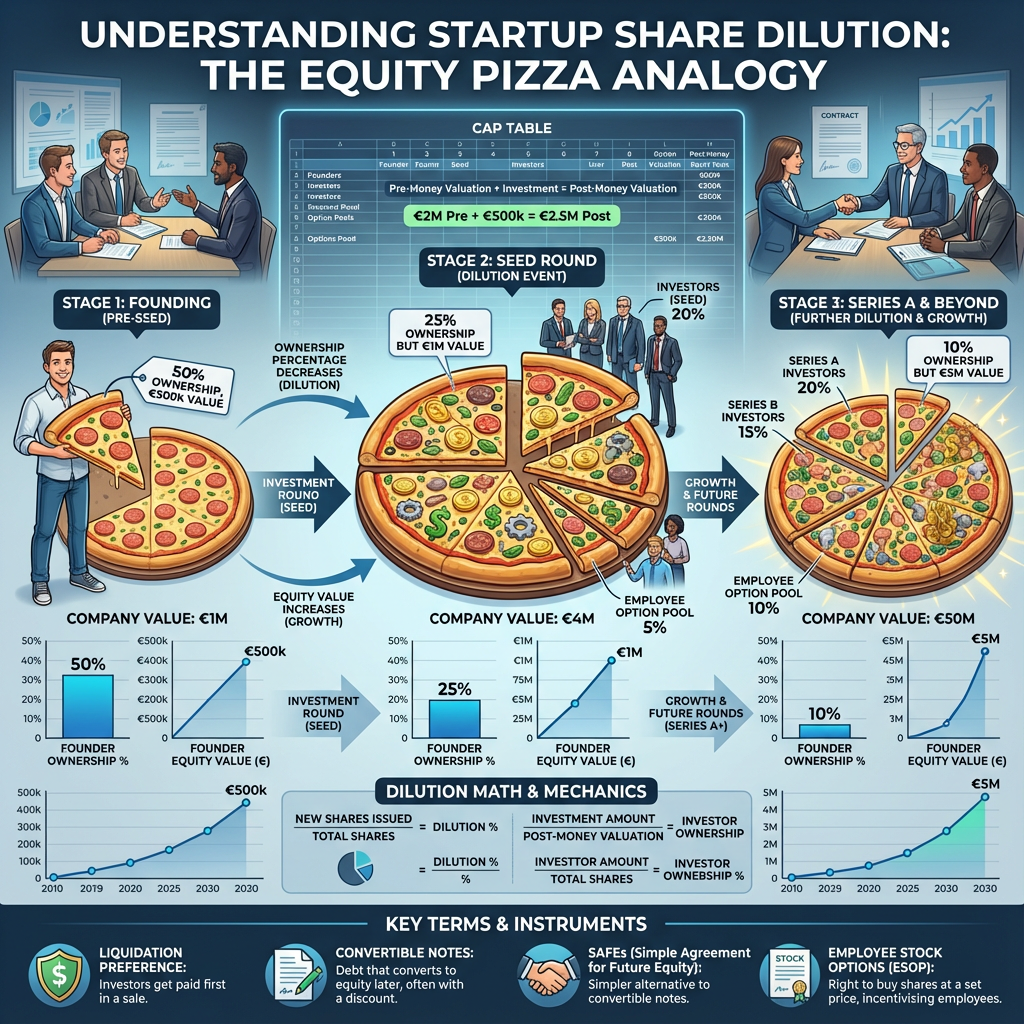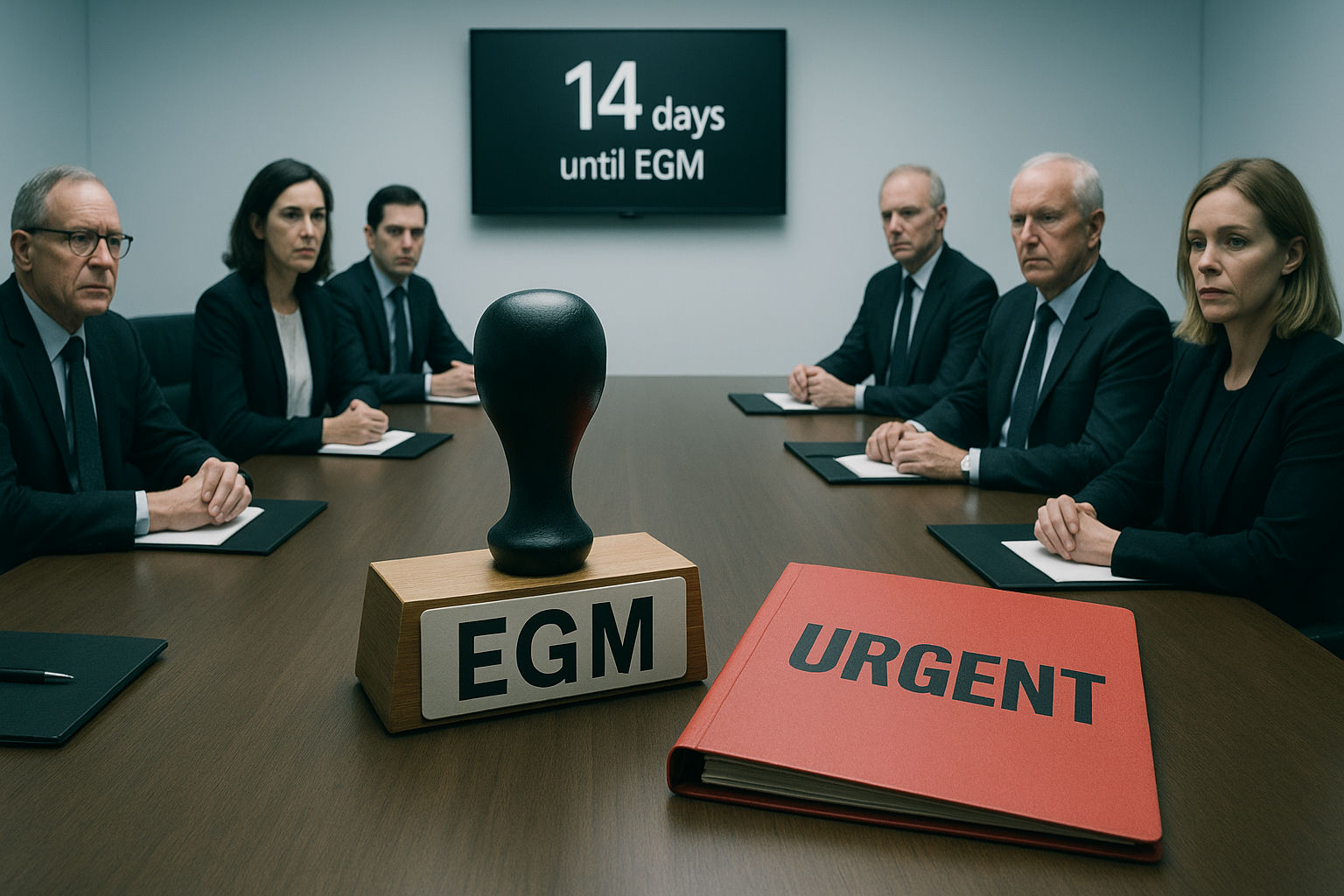This article is essential reading for startup founders and early-stage companies in Ireland considering or preparing to take investment through Dogpatch Labs' accelerator programme.
It's particularly valuable for entrepreneurs who need to understand the implications of SAFE agreements before signing one, as it breaks down complex terms into practical examples.
Key Takeaways
A SAFE is an agreement where investors provide funding to a company now, in exchange for shares later. Doing it this way can be quicker and delays putting a value on a company too early.
Key points to know about the Dogpatch Labs SAFE:
- Discount Rate - investors get a 20% discount when they convert their investment into shares.
- Conversion Events - the SAFE converts into shares automatically if you raise at least €100,000 in a future funding round (not including solo investments from Enterprise Ireland).
- MFN Clause - if you agree any future SAFEs with better terms than the Dogpatch Labs SAFE, Dogpatch Labs can adopt those better terms.
- Sale/IPO Protection - in case of acquisition or IPO, Dogpatch Labs either gets their €100,000 back or receives shares at a 20% discount.

1. Background
A SAFE (Simple Agreement for Future Equity) is a relatively new legal agreement that was started and/or made popular by Y-Combinator (the famous US accelerator programme, for those not in the know).
Over the past few years, SAFEs have become a popular way for early-stage startups to raise money without having to value their company right away.
It’s “finger-in-the-air” stuff and there can be downsides to overvaluing it too, so raising cash using a SAFE note is a good way to delay that valuation until it is (hopefully) a bit clearer what exactly the company has to offer to the world and how much that might be worth.
2. Dogpatch Labs

As part of their accelerator programme, Dogpatch Labs (DPL) invests €100,000 into a couple of companies.
Rather than, for example, giving the companies that 100k for 10% in their company, which would mean an automatic valuation of €1m, DPL invest using their own version of the Y-Combinator SAFE, tweaked for the Irish market.
The investment is made in two tranches - the first at the beginning of the accelerator programme and the second tranche upon successful completion of “Demo Day” and subject to full engagement for the accelerator.
3. How it works, Legally
When you sign a SAFE, you receive investment upfront, but no shares change hands at that moment. The SAFE only “converts” into shares when a specified event happens, typically (1) an "Equity Financing" or (2) a "Liquidity Event".
Equity Financing
DPL’s SAFE says that if and when your company raises at least €100,000 in a funding round (excluding certain Enterprise Ireland investments), the SAFE automatically converts into shares.
The number of shares the investor gets is based on the lowest price per share in the round, minus a 20% discount. So think hard before giving one of your angels a sweetheart deal - because DPL automatically gets an additional 20% discount on that.
Here’s an example of what that means:
In the lead up to an investment which would result in your company getting valued (i.e. a “priced round”), the powers that be will calculate some numbers and a 'price per share' will be established. For example, if the investment round is for a 500k investment for 20% of the company and the company already has 100,000 shares issued, then we can work out a price per share for the new shares of €20 - it’s just a calculation.
On that basis, DPL will be able to use their 100k investment to buy shares in your company at €20 (5,000 shares) but because of the discount set out in the terms of their SAFE, the shares can instead be bought for €16, which results is DPL being able to buy 6,250 shares instead of 5,000 - which slightly dilutes you a bit more.
In this case, the cap table would end up looking like this:
- Founders - 100,000 shares - 76.19%
- Investor - 25,000 shares - 19.05%
- DPL - 6,250 shares - 4.76%
It’s a good deal for DPL, but they did invest in you at such an early stage and so you will likely be more than happy with that deal too!
Liquidity Event
If your company is sold or goes public (IPO), DPL either gets their initial investment back (100k) or will get the value of the shares at the time of the sale or IPO, but with their 20% discount.
4. MFN (Most Favoured Nation) Clause
One important feature to note with the DPL SAFE is the "MFN" clause.
If you raise future rounds using other SAFEs with better terms (like a higher discount), DPL can claim those improved terms and automatically adopt them into their SAFE.
So again, when taking on additional SAFEs after the DPL SAFE, keep in mind that any more favourable terms that you agree with the new investor, may also apply to DPL.
5. Termination
There is no maturity date for the SAFE. Instead, the only way to terminate is as follows:
- Upon conversion if there is a further investment;
- Upon a sale or IPO;
- If the company is liquidated; or
- Where DPL and the company agree to a simple repayment.
6. No Voting Rights
DPL do not get any voting rights with the SAFE but once the SAFE converts, they will end up with the same rights the incoming investor gets, including voting rights if the incoming investor gets them. It will depend on the rights attached to the share class you give them.
7. Reporting and Ongoing Obligations
Once you receive investment via the DPL SAFE, you’ll have certain obligations to keep DPL informed about the company’s progress. This can include providing quarterly and annual financial accounts. You’ll also need to inform DPL if you plan on giving out any additional shares (except to employees).
8. How Could the SAFE be Better or Worse?
In terms of being worse, the obvious one would be if DPL introduced a valuation cap (although that would likely dissuade a lot of applicants). If the SAFE contained a valuation cap of €1m for example, it would mean that if your company raised an investment at a valuation of €2m, DPL’s SAFE would convert at the €1m valuation and they would ultimately be able to buy more shares for the same money - which means you get diluted more.
It could also, of course, be better. It would be nice if the MFN cap was removed. The 20% discount is probably fair given the risk they take but all in all, it’s a pretty fair deal.
How can Open Forest help?
Other than talking you through the investment and your obligations, we can help you put in place share classes that are suitable for DPL (and future incoming investors) to convert into.
We can also help with future fundraising, including the PSSF and any other legal challenges you may have.
Reach out to us below.

Stuart Connolly is a corporate barrister in Ireland and the UK since 2012.
He spent over a decade at Ireland's top law firms including Arthur Cox & William Fry.







